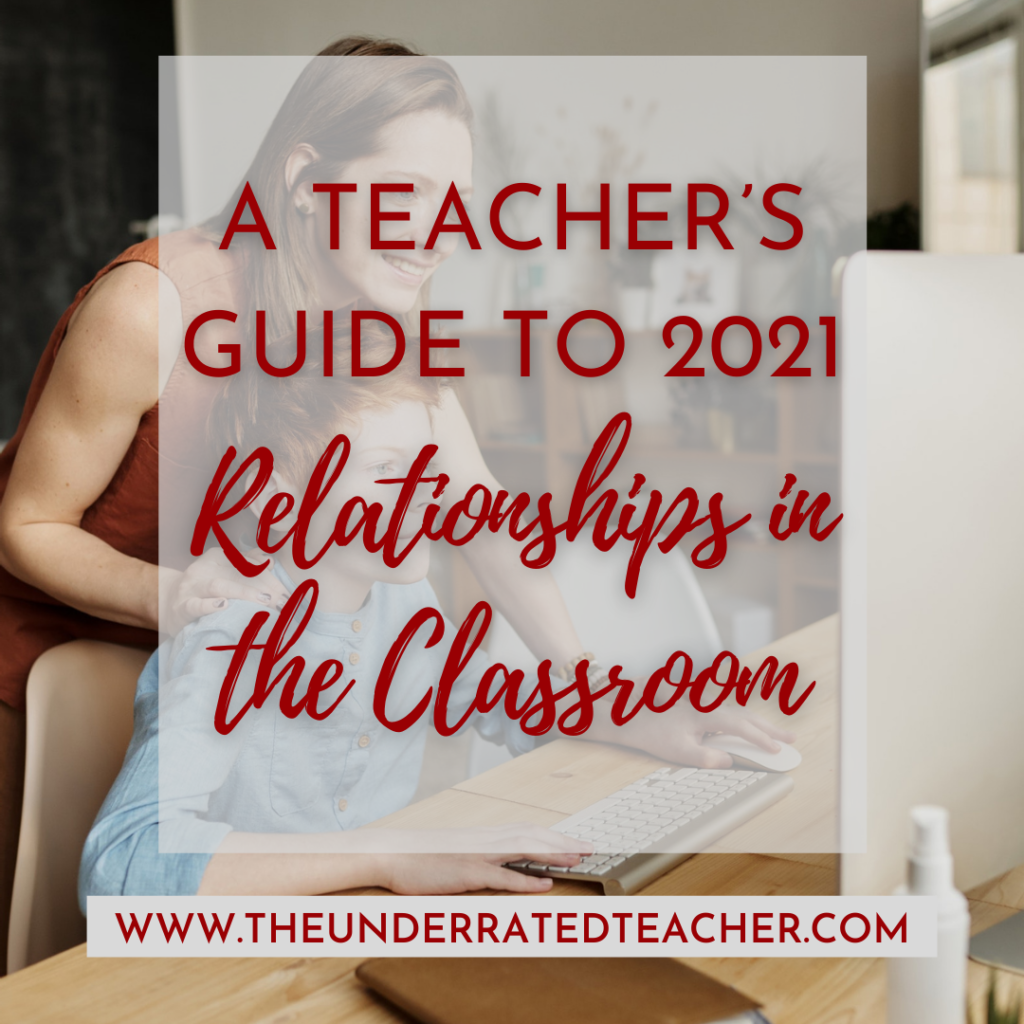Relationships in the Classroom …Sometimes teaching isn’t all about the hard facts!
2020 was a unique year for student-teacher-parent relationships. Virtual classrooms became commonplace in the kitchens, living rooms, and bedrooms of the student’s homes. Parents were present also, in the background trying to do their own work. Or hovering by the side trying to help their students (that’s what some teachers were doing). Other parents were dragging the students away from the class to help within the house. And some were even joining the class themselves to share their views and opinions. And not always welcome ones. We’ve all heard some of the horror stories.
Time to Reset
With a new year upon us, I propose that we now have the opportunity to reset the parent-teacher-student relationship. Right now, strong relationships and a triangle of support are exactly what is needed! They’re essential to helping students navigate through this tricky time.
Parents are the experts of their children. They often know what motivates them. Parents know how to get them to engage in things. Moms and dads should also have an idea of how they learn. They have been building their knowledge throughout the years. A teacher is new to the student each year. Teachers, on the other hand, are the experts at teaching. So, the teacher and parent need to form a support team and work together. The student benefits best this way, and it can be tremendous.
Simple, yes? Well, not so much.
The Student Success Triangle
There are two key steps to this successful triangle.
Number 1: Win over the Students
Number 2: Influence and win over the parents.
To me the key is a combination of respect, trust, communication, and concentrating on the wins more than the losses, here’s a bit more on that below.
Trust and Respect
The Student
Trust is a huge part of the teacher-student relationship. Students experience high levels of stress and anxiety throughout high school. Even more so during these uncertain times. Checking in daily for school online or in a class has offered an element of routine for some which are welcomed as an avenue of support and company during this time. Building trust between the student and teacher is key to keeping the student engaged and motivated to learn.
When we respect someone in life, we work hard for them. When necessary, we turn up for them and want them to think highly of us. This is the same for a student and teacher, building a professional, open, honest relationship with your students, where they realize that you 1. understand your subject and have lots of knowledge to share, and 2. Understand them and the best way to help them learn, then you are on your way to bringing the student onboard.
Students need to have trust in their teachers. They need to know that teachers are interested in them as a person. And they have their best intentions at heart. When establishing these relationships in the classroom, speaking to the students in a way they understand. Concentrate on delivering the message, even if it takes five different ways until it sinks in. Students need to trust the teacher’s subject matter expertise too!
The Parent
Similarly, it is important to try and build trust between the teacher and the parent. This year like no other has demonstrated the overwhelming dedication of teachers to keep education moving during difficult times. Many parents have noticed this dedication and had a birds-eye view of what is required to keep lessons going working with large groups of children and teenagers all day. A dabble with homeschooling coupled with entertaining their children at home all day has given much new respect for teachers and all that they achieve.
This offers a chance to build new partnerships and relationships with parents. To get them on board to help form a three-way partnership. Of course, not all parents are the same, with some seeing the teachers in a negative light when beamed into their homes, but for the majority, the overwhelming thought was one of appreciation, admiration, and respect.
Celebrate the Wins
The Student
Everyone likes to receive praise, and students are no different. The odd well done here, and that’s fantastic there goes a long way in building a student’s confidence. It helps in keeping them motivated to learn. Not to mention, you tend to like people who complement you!
It’s on this note, that I’d say, it’s also not always about the hard facts. We’ve all heard the phrase pick your battles. Well, this also applies to the student relationships in the classroom, virtual or otherwise. It’s not always necessary to strive for perfection. What do I mean by this? Try not to overcorrect students when they are trying to participate in class. If it is wrong information that will have a detrimental effect on their learning, then that’s fine. But keep silent on small things that don’t really matter. Sometimes, it’s worth just letting them go and keeping the balance with the wins over the losses where you can.
The Parent
This philosophy is reflected in the teacher-parent relationship too. It is important to share and celebrate the student wins with the parents. In the absence of face to face meetings, small notes and emails to parents are a tremendous help. Tell them how well their child did at a particular project or test. It goes a long way in getting the parent to understand that their child is achieving. Above all, it could give a parent a reason to organize a special meal so the family can celebrate together. Or maybe it could just simply let them give the student additional time to study. Either way, keeping the parents in the loop of the good stuff is great.
Keep in mind, we all know that feeling when we see an email or call from a teacher. Right away, we think, oh no, what has my child done now? Or oh dear, have they hurt themselves? What a relief and pleasant treat if it’s actually a message just to tell them how wonderful their child is. There are enough times that a teacher has to get in touch about the negative stuff. Try and counterbalance it with the good where you can.
Communication
The Student
2021 is all about building new and effective ways of communicating. Some teachers are having to get to know the whole new classes online-only, which is a difficult task. So making sure that you give students lots of ways to speak to you. Make it easy to reach you. The key is to let them get to know a little bit about you beyond the relationships in the classroom. It is critical in building rapport. If you are an avid fisher outside of school, tell them, or if you love baking – show them your tasty treats every now and again.
Similarly, find time in the schedule for fun activities that allow you to get to know your students. Give them free rein to choose subjects and topics for short fun projects or activities so you can build an idea of what they are interested in. Being fun, approachable, and interesting through engaging communication is really important.
The Parent
Establishing a relationship with the parents as early on as possible is key. Let them tell you about their child; they know them best and they will value being asked. Tell them that you want to work in partnership to do the best for their child. And that’s hard for a parent not to respond to, even those that are less involved. Most importantly, you can also give them some ideas about the best way to do this. Some parents speak limited English. Others have little time or education, so giving them some hints on how best to support their child can help. It may even be just engaging them in a discussion about what they are learning over breakfast. Or ask to see some of their work in creative subjects. Many parents would like to help with their child’s education, but need to teach themselves to know what to do.
Relationships in the Classroom: Key Takeaways
In conclusion, here are some extra little takeaways about dealing with parents:
• ALWAYS smile when you see them
• Learn their names
• Tell them you want to work in part
• Invite them to share information
• Give them ample avenues to get in touch with you
• Understand they too have had a difficult year
Hope these insights help YOU navigate your classroom relationships! And if you have feedback, let us know! We’d love to learn from your experience!



